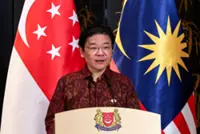SINGAPORE (The Straits Times/Asia News Network): Singapore is headed for a difficult year in which economic growth will slow while inflation will remain high, partly because wage increases are expected to continue.
Global prices may come off their recent peaks but inflation here will remain higher next year than the historical average, said the Monetary Authority of Singapore (MAS) on Thursday (Oct 27) in its biannual Macroeconomic Review.





